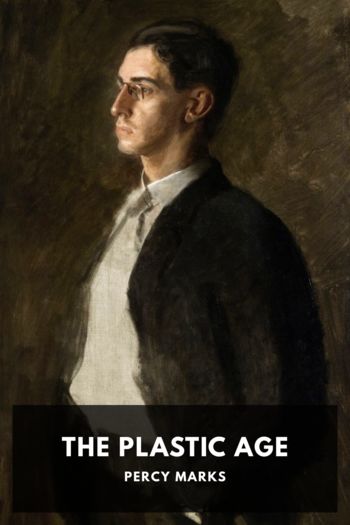The Plastic Age by Percy Marks (e book reader pc .TXT) 📕

- Author: Percy Marks
Book online «The Plastic Age by Percy Marks (e book reader pc .TXT) 📕». Author Percy Marks
Sanford immediately took the offensive in the second half. Slade was consistently carrying the ball. Twice he brought it within Raleigh’s twenty-five-yard line. The first time Raleigh held firm, but the second time Slade stepped back for a dropkick. The spectators sat silent, breathless. The angle was difficult. Could he make it? Would the line hold?
Quite calmly Slade waited. The center passed the ball neatly. Slade turned it in his hands, paid not the slightest attention to the mad struggle going on a few feet in front of him, dropped the ball—and kicked. The ball rose in a graceful arc and passed safely between the goalposts.
Everyone, men and women alike, the Raleigh adherents excepted, promptly turned into extraordinarily active lunatics. The women waved their banners and shrieked, or if they had no banners, they waved their arms and shrieked; the men danced up and down, yelled, pounded each other on the back, sometimes wildly embraced—many a woman was kissed by a man she had never seen before and never would again, nor did she object—Wayne Gifford was turning handsprings, and many of the students were feebly fluttering their hands, voiceless, spent with cheering, weak from excitement.
Early in the fourth quarter, however, Raleigh got its revenge, carrying the ball to a touchdown after a series of line rushes. Sanford tried desperately to score again, but its best efforts were useless against the Raleigh defense.
The final whistle blew; and Sanford had lost. Cheering wildly, tossing their hats into the air, the Raleigh students piled down from the grand stand upon the field. With the cheerleaders at the head, waving their megaphones, the boys rapidly formed into a long line in uneven groups, holding arms, dancing, shouting, winding in and out around the field, between the goalposts, tossing their hats over the bars, waving their hands at the Sanford men standing despondently in their places—in and out, in and out, in the triumphant serpentine. Finally they paused, took off their hats, cheered first their own team, then the Sanford team, and then sang their hymn while the Sanford men respectfully uncovered, silent and despairing.
When the hymn was over, the Sanford men quietly left the grand stand, quietly formed into a long line in groups of fours, quietly marched to the college flagpole in the center of the campus. A Sanford banner was flying from the pole, a blue banner with an orange S. Wayne Gifford loosened the ropes. Down fluttered the banner, and the boys reverently took off their hats. Gifford caught the banner before it touched the ground and gathered it into his arms. The song-leader stepped beside him. He lifted his hand, sang a note, and then the boys sang with him, huskily, sadly, some of them with tears streaming down their cheeks:
“Sanford, Sanford, mother of men,
Love us, guard us, hold us true.
Let thy arms enfold us;
Let thy truth uphold us.
Queen of colleges, mother of men—
Alma mater, Sanford—hail!
Alma mater—Hail!—Hail!”
Slowly the circle broke into small groups that straggled wearily across the campus. Hugh, with two or three others, was walking behind two young professors—one of them, Alling, the other, Jones of the economics department. Hugh was almost literally brokenhearted; the defeat lay on him like an awful sorrow that never could be lifted. Every inch of him ached, but his despair was greater than his physical pain. The sharp, clear voice of Jones broke into his half-deadened consciousness.
“I can’t understand all this emotional excitement,” said Jones crisply. “A football game is a football game, not a national calamity. I enjoy the game myself, but why weep over it? I don’t think I ever saw anything more absurd than those boys singing with tears running into their mouths.”
Shocked, the boys looked at each other. They started to make angry remarks but paused as Alling spoke.
“Of course, what you say, Jones, is quite right,” he remarked calmly, “quite right. But, do you know, I pity you.”
“Alling’s a good guy,” Hugh told Carl later; “he’s human.”
XIAfter the Sanford-Raleigh game, the college seemed to be slowly dying. The boys held countless postmortems over the game, explaining to each other just how it had been lost or how it could have been won. They watched the newspapers eagerly as the sport writers announced their choice for the so-called All American team. If Slade was on the team, the writer was conceded to “know his dope”; if Slade wasn’t, the writer was a “dumbbell.” But all this pseudo-excitement was merely picking at the covers; there was no real heart in it. Gradually the football talk died down; freshmen ceased to write themes about Sanford’s great fighting spirit; sex and religion once more became predominant at the “bull sessions.”
Studies, too, began to find a place in the sun. Hour examinations were coming, and most of the boys knew that they were miserably prepared. Lights were burning in fraternity houses and dormitories until late at night, and mighty little of their glow was shed on poker parties and crap games. The college had begun to study.
When Hugh finally calmed down and took stock, he was horrified and frightened to discover how far he was behind in all his work. He had done his lessons sketchily from day to day, but he really knew nothing about them, and he knew that he didn’t. Since Morse’s departure, he had loafed, trusting to luck and the knowledge he had gained in high school. So far he had escaped a summons from the dean, but he daily expected one, and the mere thought of hour examinations made him shiver. He studied hard for a week, succeeding only in getting gloriously





Comments (0)